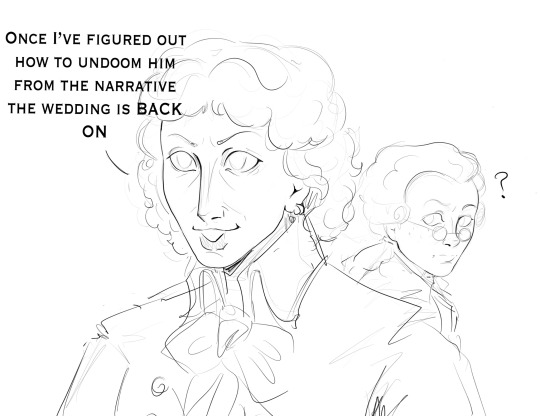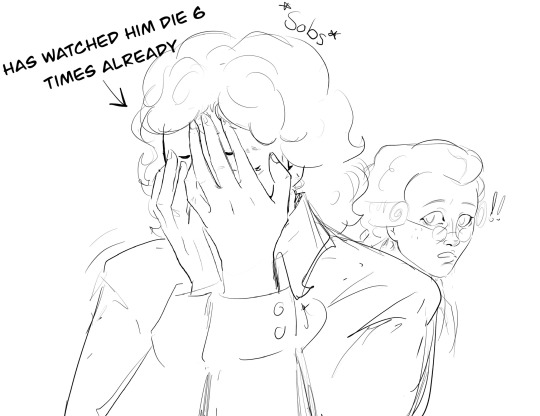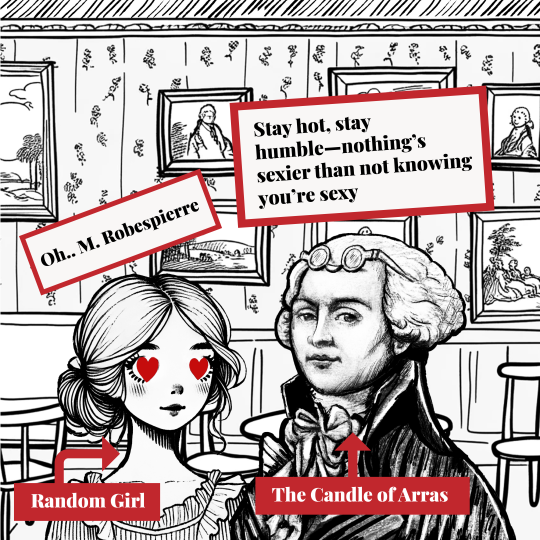#Robespierre keeps dying no matter what he does
Explore tagged Tumblr posts
Text


Who ordered a um… *checks receipt* a Frev timeloop au?
#saintspierre#antoine de saint just#antoine saint just#saint just#robespierre#maximilien robespierre#frev#frevblr#frev art#Saint-just is going through it ya’ll#Robespierre keeps dying no matter what he does#the timeloop resets everytime Robespierre dies#or if Saint-Just does#he’s never gotten further than thermidor 10
234 notes
·
View notes
Text

February has finally come to an end, and being the so-called "month of love" (or so the obscene number of pink Hallmark cards in supermarkets would have me believe), I thought—despite being very, very late for Valentine’s Day (when am I not late for everything?)—I’d take the opportunity to talk about Robespierre’s love life. Because surely, he had one, right?
Well... that depends on who you ask. Accounts of Robespierre’s romantic escapades range from total abstinence to secret debauchery and a supposed porn addiction, depending on which political or moral flavour the historian (1) writing the accounts subscribes to.
In case you’re dying of curiosity: there is precisely zero evidence that Maximilien Robespierre slept with anyone—man, woman, or even himself. Nothing. Nada. Zilch.
Does this mean he didn’t? Was he asexual? Abstinent? Just busy?
No. It simply means that if he did have any romantic or sexual encounters, he was extremely discreet about them (and why wouldn’t he be? It’s not as if he’d start randomly monologuing about his love life mid-speech at the Convention or the Jacobins).
As for his relationships with women, here’s what we do know:
As a politician, he was wildly popular with women, to the point of receiving marriage proposals in the mail.
He never married, and while rumours of his engagement exist, they remain just that—rumours. He died at 36, unmarried, childless, and leaving behind no diary or trove of love letters to illuminate his feelings.
He has been posthumously linked to three women: Anaïs Deshors, Éléonore Duplay, and Annette Duplessis. However, these claims are flimsy at best, often put forth by people with their own agendas.
He did, however, write love poems to several women in Arras: a Miss Orptelia Mondlen, a Mlle Henriette, an Émilie Demoncheaux (on the eve of her wedding, no less), and a certain Sylvie.
In short, if we want to find any direct evidence of Robespierre’s feelings towards women, we have to turn to his poetry. And since this is Robespierre—where everything must have some kind of political dimension—let’s talk about how his one publicly released love poem was used against him in the monarchist press.
Robespierre’s Love Poems
As mentioned, a number of love poems have been attributed to Robespierre, though not always convincingly. He wasn’t particularly eager to see them published, and only one ever made it to the general public during his lifetime—both times without his consent.
The poem in question is a madrigal dedicated, according to the Œuvres, to a “Miss Orptelia (possibly Ophelia?) Mondieu.” It was first published anonymously in 1787 in two different collections, without Robespierre’s knowledge. Later, it was republished—again without his consent—by the royalist writer François-Louis Suleau (2), who used it to mock him.
Here’s the poem:
Madrigal
Crois-moi, jeune et belle Ophélie, Quoi qu’en dise le monde et malgré ton miroir, Contente d’être belle et de n’en rien savoir, Garde toujours la modestie. Sur le pouvoir de tes appas Demeure toujours alarmée Tu n’en seras que mieux aimée, Si tu crains de ne l’être pas.
And my translation:
Madrigal
Believe me, young and beautiful Ophélie, No matter what the world may say, and despite thy looking-glass, Content to be beautiful yet know naught of it, Keep thy modesty always. Be ever wary of the power of thy charms; Thou shalt be all the more loved, If thou fearest not being unloved.
Baudelaire, he is not. But it’s charming in its own earnest, slightly awkward way, no? Hardly the stuff of grand, sweeping romance, but if someone wrote this for me, I’d at least pretend to be flattered.
So why was it mocked? Well, for Suleau and his fellow scribes at Actes des Apôtres (3), this was an opportunity far too delicious to ignore.
The Mockery of Suleau
In a November 1789 issue of the paper, Suleau went after Robespierre with sharp sarcasm, mocking him over a minor linguistic mistake in one of his speeches—using "aristocrassique" instead of "aristocratique"—and dismissing him as a mere "poor scholarship student," while feigning an air of condescending generosity. Then came the poetic insults: Suleau sarcastically presented the madrigal as a work of supreme literary genius, only to rip it apart.
He compared Robespierre’s writing to Tacitus, only to immediately undercut the compliment by drawing a parallel to Montesquieu—before mockingly dismissing the comparison, given Montesquieu’s "aristocratic tendencies."
The pièce de résistance? A biting final flourish in which he ironically declared Robespierre a polymath—poet, historian, geographer, naturalist, physicist, journalist, legislator—before delivering the ultimate insult: if Mirabeau was the “torch of Provence,” then Robespierre was merely the “candle of Arras.”
In case it wasn’t obvious, this had little to do with Robespierre’s poetic talents and everything to do with his politics.
Robespierre’s Response
How did Robespierre react? He didn’t. Not a word—not even to disavow the poem. Clearly, he subscribed to the "don’t feed the trolls" school of thought.
The fact that he didn’t deny authorship was enough for historians like Eugène Déprez (who compiled the first volume of Robespierre’s Œuvres Complètes) to confidently attribute it to him.
What Do His Poems Tell Us About Him?
Is that enough proof? Debatable. But even if we accept that Robespierre wrote this madrigal and the other five attributed love poems (mediocre as they may be), what do they actually tell us about him?
His greatest fan, historian Albert Mathiez, thought these poems proved that "far from possessing a barren heart, as some have claimed, he was endowed with a trembling sensitivity and by nature sought the company of the fairer sex."
Did he? Do these light verses really reveal that much?
Personally—and this is just an opinion, because when it comes to Robespierre’s love life, opinions are all we have—I think what these poems tell us most is that, back in the 1780s, Robespierre understood what was expected of a proper gentleman and was trying to play the part. In short, he was capable of fulfilling societal expectations.
That doesn’t mean he never had romantic feelings, but as far as we know, despite the interest some women clearly had in him, none of these romantic fantasies ever became anything more than words on a page.
Note (1) Frankly, the word "historian" is no guarantee of quality research when it comes to the French Revolution).
(2) François-Louis Suleau, a royalist journalist who attended school with Robespierre and Desmoulins, later becoming one of their most vocal critics.
(3) Actes des Apôtres was a royalist newspaper published during the early years of the French Revolution. Founded in 1789 by Jean-Gabriel Peltier and featuring contributors like François-Louis Suleau, the publication served as a satirical and polemical counter-revolutionary voice. It's actually quite funny to read.
141 notes
·
View notes
Text
The Danton Case - Complete Notes
More like disjointed amusing moments, but whatever.
Here is a complete post of my notes through all 5 acts of Pryzybyszewska’s Danton Case! I really enjoyed doing this, and I hope you all did as well. Let me know if I should do Thermidor as well....
Act I
Robespierre: Well, this is too much. I look like a gigantic withered cauliflower.
Note: this is his first line in the play.
We’re not going to talk about Eléonore trying to give Maxime a blowjob we’re just not
please don’t make me
please
Eléonore and Robespierre have a really weird relationship in this; he barely tolerates her existence, but keeps being very physical with her and it’s very uncomfortable to read.
“Child, I do not love you anymore - I am literally indifferent to you!”
I don’t even know what to say about Saint-Just in this he’s barely human
Saint-Just [glumly]: Are you delirious? Robespierre: [bursts out laughing, which does not necessarily reassure his friend]
Robespierre has strange names for people
Eléonore is “lioness,” “viper” etc.
Camille is “calf” “wonder child” “talented baby” and a bunch of just…random stuff
Danton and Co. have really weird code names that are never explained
Danton himself is C Three. No idea why.
Louise absolutely despises Danton with her whole heart
[Camille Desmoulins rushes in, very excited]
Again, this is how he enters the play
Danton: Stay. Well, Camille? Have a drink. Well, what have you done now?
Everyone wants to be a dictator and tyrant!! cause that’s how it went.
Act II
Collot: let’s kill Camille!! Robespierre: ...no.
Paraphrased, but barely
Camille: Danton, I will not allow even you to make such jokes. Danton [grips and squeezes him]: What, you won’t allow it?! [squeezes him stronger] You still won’t? Camille [swooning]: Mm-n-mm…oh!
Camille [more softly, clasping his hands nervously] Georges: send me to die. I want to die for you. Danton [gives a friendly laugh] Better write, instead of dying...what use is your corpse to me?
yeah no one actually has any respect for Camille in this play
Vadier [a veritable mimosa as far as his self-love is concerned]
[sparks fly from Danton’s eyes]
he has laser eyes, who knew?
Danton: And you still won’t take your mask off, thought I see through it to every line on your face?! English blood, no doubt….[Robespierre reacts with an Irish look, knowing that it is not worth correcting such remarks]
Robespierre: Oh, yes: I’ve made a fatal mistake. Danton is a source of the plague.
[Camille rushes in, ill-tempered, throws off his cloak and hat, falls on the sofa and assumes a depressed pose.] Lucile: Well…? [when her husband makes a demonstrative gesture] Oh, my spouse! We’ve done something foolish again?!
Robespierre: He [Camille] simply must have his melodrama!
Camille’s sitting in front of him. They’re the only ones in the room.
Robespierre and Camille fight brutally, and to be honest it really hurts to read.
Act III
Actually, both Robespierre and Danton want to be king. Who knew?
Collot [starts to his feet]: Who asked you to interfere, you...underling?! Lindet: Thank you for that honorable title, hangdog. [Collot throws himself at Lindet, restrained by those near him.]
Lindet seems to spend the rest of the CPS meeting ringing a bell and begging people to shut up.
Robespierre: Which of us will go drown out that miracle-making thunderous bass (Danton)? My drawing-room contralto, perhaps? Or Saint-Just’s low-pitched tenor?
Robespierre is very musical in this play, whistling “the entire chromatic scale” in Act I for no reason and then doing this in Act III
[Lindet vehemently rings the bell]
Saint-Just (looking for paper): Nothing doing without the secretary…. [attacks the cabinet, breaks fingernails]
smooth, dumbass. lmao
[Delacroix has the familiar Satanic expression of a fellow conspirator]
Camille [shakes]: Don’t dare mention him (Robespierre)! [leans towards him (Danton) across the table] I’ve spent my life on my knees before the two of you. I’ve worn myself out in your service. And you both knew slyly how to exploit my blindness. From now on I am a free man. I don’t care what happens to me… but I’ve broken with both of you, rotten idols, forever. [turns away]
His newly-declared independence lasts approximately 1 page before he collapses sobbing and pledges his allegiance to Danton again
Again, Danton is uncomfortably physical and abusive with Louise.
She hates him so much… there is no healthy relationship in this play.
ahhhh shit it’s time for the “trial”
Robespierre: I request - the right - to speak!
Most characteristic line yet, if you ask me
Why is Courtois defending Danton? Or does he just hate Robespierre that much?
Act IV
[Camille is standing by the window, crying]
This is roughly the third time this has happened in this play
Philippeaux is just yelling at a very depressed Camille it’s not fun to read Camille: Have pity...and help me, or I shall perish!!! [throws himself on the bed] Philippeaux: You will die in five days, Desmoulins. [Camille goes numb. His crying stops like a switched-off radio]
ngl this made me...very upset
Figure II [stretches out his hand]: Camille, no irony is intended: we thank you in the name of France. [Camille, consoled, returns the embrace and smiles] Philippeaux: Camille - that’s the Comte and Vicomte d’Estaing (royalists). [Camille withdraws, horrified.]
Everyone’s sitting on each other’s beds and it just reads like a massive sleepover for these few lines (ignoring the fact that they’re imprisoned and will be dead in 5 days)
Lucile tries bribing the judges, and is rather disappointed when they don’t take her bribes.
And then Legendre walks in and Lucile is like “you know what? New plan. Hey Legendre you’re a butcher right? Go murder Robespierre!”
Lucile?!?!?!?
[But the essentially gay tone does not change]
That’s a decent summary of Pryzybyszewska
[It is likely that Desmoulins will provoke deadly French laughter deriding both him and his party]
Fouquier-Tinville is already so done with everyone
Robespierre (to Eléonore) [extends one hand to her; he leaves the other on his forehead]: I am sorry. I’m going insane.
Robespierre forgot to eat for like 36 hours and honestly? same
also he’s an authoritarian dictator now i guess
[Robespierre breaks into sonorous, pleasant laughter and disappears]
Act V
[Desmoulins is standing on the table, at which Philippeaux is reading]
This is the stage setup at the beginning of the act. Camille is still Camille.
Danton: Ah, that is exactly the point! Ha, ha! Maxime has done me a very good turn by having systematically concentrated power in his own hands for years: all I need to do now is to take from him… a ready-made dictatorship!
...What?
Camille’s trying desperately to convince Danton to spare Robespierre’s life after all of this he’s still trying to save his friend whyyyyyyyyyyy
[Danton stretches his hand towards the candle] Camille [nervously]: No!!! Georges, please don’t put it out!... Danton [with outstretched hand]: But why? Camille: It’s so horrible here… please leave it, I implore you!
Look, I hate Camille’s infantilization in media as much as the next person, but ahhhh my heart
Camille [after a while, shyly]: Georges….
Danton starts to like...feel himself up and monologue dramatically while everyone else is asleep it’s a real weird page and a half
also he calls Robespierre a “red Irish monkey”
Camille starts screaming and talking in his sleep, begging someone (Robespierre, I wonder?) for forgiveness
Philippeaux: But what did you have against saving that boy - whom, without any reason, you have driven to suicide?... Danton [gives Camille a contemptuous look]: Should I have gratified Robespierre, do you think? For that matter, it will be better for Desmoulins himself to die than to prostitute himself again.
[Depressed silence again. Robespierre slowly places his elbows on the table, and his forehead on his joined hands.]
same
This is roughly the part where Robespierre begins to collapse mentally - continuing well into the next play, “Thermidor”
Fouquier: [bangs the table with a file because Danton is opening his mouth again]
Danton actually manages to turn the whole crowd against the Committee - the mob starts calling for immediate acquittal and protesting the mockery of a trial
Fabre: Thank God it’s the end. I’m barely alive anyway.
Pryzybyszewska makes very clear that the whole trial is corrupted and rigged against the Indulgents
aaaaaand cut their hair, exit stage, we never see them again
Saint-Just and Robespierre have a long conversation about oppression and dictatorship that takes several rapid and interesting turns
Robespierre: Maybe it is madness.
Saint-Just [over his shoulder]: It is not madness, it’s despair. [He turns round. Speaks nonchalantly, but clearly] Shoot yourself. [He stops by the window, aimlessly looking at the yard. Robespierre slowly falls onto the bed, lies down.]
I….what?!?
Antoine, what?????
Robespierre: *lies down for the first time in god knows how long* [He (Barère) rushes into the room. Robespierre, brutally wakened, lifts himself on his shoulder with a slight hiss of fright. In a second he gives the intruder a deadly look which totally puts Barère out of countenance.] Barère: Oh… I’m sorry. May I?… Robespierre [motionless, sits on the bed]: You’re asking that question somewhat late….
[Saint-Just comes in with a helpless shrug of his shoulders]
[Saint-Just watches him with glowing eyes]
[Both gens de la haute main (Robespierre and Saint-Just) look at each other as if mutually hypnotized by their appearance. A long pause of perfect immobility.]
Robespierre [tense all of a sudden. Dead silence in the room.] Do you hear?... Saint-Just [sulking]: What? Robespierre: The crowd is coming back. Saint-Just: Requiescant in pace.
#ari babbles#ari reviews the danton case#the danton case#stanislawa pryzybyszewska#pryzybyszewska#thp#hope you enjoyed!
15 notes
·
View notes